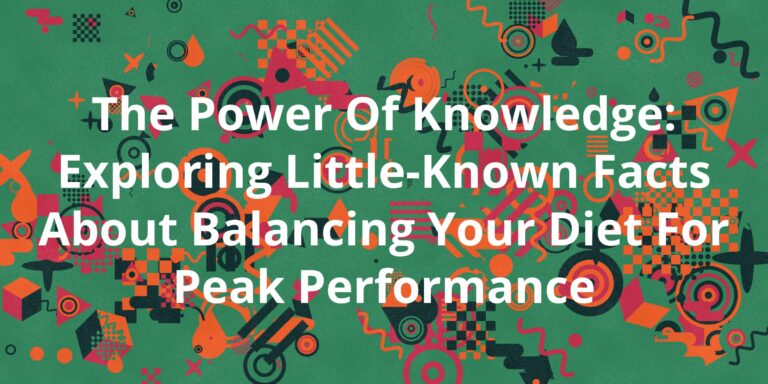Transform Your Health with Our Ultimate Balanced Nutrition Guide
Are you looking to improve your health? Are you tired of feeling sluggish, weak, or sick? If so, it’s time to start paying attention to what you put into your body. The food and drink you consume can have a significant impact on your overall well-being, from boosting your energy levels to reducing your risk of chronic diseases such as heart disease, diabetes, and cancer. In this article, we will provide you with our ultimate balanced nutrition guide to help you transform your health and live your best life.
What is Balanced Nutrition?
Balanced nutrition refers to the consumption of a variety of nutrient-dense foods that provide the body with all the essential vitamins, minerals, proteins, carbohydrates, and healthy fats needed for optimal health. A balanced diet can help improve energy levels, support the immune system, maintain a healthy weight, reduce inflammation, and lower the risk of chronic diseases.
The Key Nutrients to Include in Your Diet
To achieve balanced nutrition, it’s essential to consume a variety of nutrient-dense foods from all five food groups: fruits, vegetables, whole grains, lean protein, and healthy fats. Here are the key nutrients that you should be including in your diet:
1. Fruits and Vegetables: These foods provide essential vitamins, minerals, fiber, and antioxidants that help protect against chronic diseases such as heart disease, diabetes, and cancer. Aim for at least five servings of fruits and vegetables per day.
2. Whole Grains: Whole grains are a great source of fiber, B vitamins, and minerals. Choose whole grain bread, pasta, cereals, rice, and quinoa over refined grains such as white bread and sugary cereals.
3. Lean Protein: Protein is essential for building and repairing tissues, supporting the immune system, and maintaining muscle mass. Good sources of lean protein include chicken, fish, tofu, beans, lentils, and nuts.
4. Healthy Fats: Healthy fats such as omega-3 fatty acids found in salmon, walnuts, and chia seeds, help reduce inflammation and improve heart health. Incorporate healthy fats into your diet by choosing avocados, olive oil, nuts, and seeds.
5. Dairy or Dairy Alternatives: Dairy products such as milk, cheese, and yogurt provide calcium and vitamin D, which help build and maintain strong bones. If you’re lactose intolerant, choose dairy alternatives such as soy, almond, or coconut milk.
Avoid Processed Foods and Added Sugar
While it’s essential to consume a variety of nutrient-dense foods, it’s also important to avoid processed foods and added sugar. Processed foods are often high in salt, sugar, and unhealthy fats, and can contribute to weight gain, inflammation, and chronic diseases. Added sugar is found in many foods and drinks such as soda, juice, and baked goods, and can lead to insulin resistance and type 2 diabetes if consumed in excess.
Stay Hydrated
Water is essential for overall health, and it’s important to stay hydrated throughout the day. Aim for at least eight glasses of water per day, and limit your intake of sugary drinks such as soda and juice.
Conclusion
Transforming your health with balanced nutrition may seem daunting at first, but with a little bit of effort and dedication, it’s achievable. By incorporating a variety of nutrient-dense foods from all five food groups, avoiding processed foods and added sugar, and staying hydrated, you can improve your energy levels, reduce inflammation, maintain a healthy weight, and lower the risk of chronic diseases. Remember, it’s never too late to start making healthier choices – start today and transform your life!



